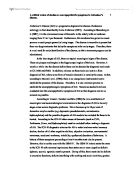Problem Statement
The problems facing St. Barnabas Senior Service Center parallel areas of concern for the Alzheimer’s population as a whole: incorporation of family into the treatment process, depression as a result of occupational imbalance, decreased socialization, and decreased motivation. The facility currently operates a Day Care Resource Center for its Alzheimer’s population, offering exercise groups, support groups, and crafts, as well as transportation, food delivery, and medication services. Despite these services, St. Barnabas continues to look for alternative intervention to meet the needs of all its client population, specifically those who have not responded to current treatment due to the severity of their diagnosis or motivational factors. Implementation of an Animal-Assisted Therapy (AAT) program, grounded in the principles of occupational science and occupational therapy, at St. Barnabas will offer the clinic’s elderly Alzheimer’s population with a new therapeutic alternative while also complementing the facility’s current network of services. A successful occupation-oriented AAT program, incorporating the client, treatment team, family/caregiver, as well as other staff and peers, will serve to improve the clients’ physical, mental, and emotional health, and help them to regain occupational balance, enhancing their overall quality of life.
Method
Initial program development began with completion of a needs assessment of St. Barnabas Senior Service Center in order to establish knowledge of current services offered and to determine the unique concerns of the facility’s service population. Extensive research was then conducted to ascertain the potential effectiveness of an AAT program and how well a therapeutic medium of this nature would complement the clinic’s already existing services. Once it was determined that St. Barnabas could benefit from the addition of this form of therapy, the process of selecting an appropriate animal began.
According to guidelines set by Delta Society, a national licensing organization in the field of AAT, only domesticated animals, such as dogs, cats, guinea pigs, rabbits, horses, etc., can be considered for AAT. From my research, it became clear that the dog was one of the more popular choices. Breed selection then began, taking into account the distinctiveness of the population in question, unique characteristics of several dog breed, and the decision that I would raise and train the first animal to be used with the initial pilot treatment group. Books, journal articles, and internet resources were used for the selection process, as well as email and phone conversations with breeders and pet store experts found through snowball sampling. Based on the data gathered, the final decision was made to purchase a male fawn pug for the initial therapy animal, because of their mellow yet sociable temperament, low exercise and grooming requirements, trainability, relatively low number of health risks, and its friendliness toward strangers and other animals. Basic puppy training will begin in early February 2003, followed by AAT training, consistent with AAT guidelines, and eventual certification of both the animal and myself once the animal reaches the minimum certification age of 1 year old.
The initial AAT participants will consist of a pre-selected group of seniors with Alzheimer’s disease of moderate severity currently receiving services at St. Barnabas, as agreed by Dr. Herb Shon, MSW, Ph.D., director of St. Barnabas, myself, and a co-therapist. Intervention
will be provided within both a group setting and on an individual basis. Occupations will range in objectives, from those addressing physical, mental, or emotional concerns to activities for educational purposes. As an occupational therapist and occupational scientist providing such an intervention, it will become crucial to the success of this program that I become familiar with the occupational history of each individual within the group and that treatment is provided with the values and interest of each unique client in mind. Influenced by Dr. Zemke in OT 604 (Temporal Adaptation), the specific temporal rhythms of the clients will also be taken into account when establishing the duration, frequency, and schedule for treatment. Consistent with the ideas of the Well Elderly study, intervention will comprise of occupation-based activities adapted to resemble client-specified occupations from their lives that are meaningful and purposeful. Thus, the animal will be incorporated within the treatment, as well as act as an integral player in the occupational story-telling and story-making process of each client. The documented successes and difficulties of this initial treatment group will be evaluated after a three month period, after which adjustments will be made for possible program expansion to include a larger and more diverse service population and to incorporate other family members and their pets.
Timeline
Fall semester 2002 → Research of AAT literature
Fall semester 2002 → Contact with breeders via email and phone; animal and breed selection
Jan 2003 → Discussion of basic guidelines of new AAT program with Dr. Herb Shon and
co-therapist.
Early Feb 2003 → Purchase of puppy (approx. 10 wks old); basic puppy training begins
Late Feb 2003 → Introduction of puppy to clinic setting and client population; AAT
training begins
Mar ~ May 2003→ Development of AAT group/individual activities with preliminary
AD participants
June ~ Aug 2003 → Integration of client/family members’ pets into AAT activities;
Increase AAT frequency/duration and number of participants
Product
An occupation-based Animal-Facilitated Therapy program for older adults with Alzheimer’s disease in the LA Metro area served by St. Barnabas Senior Services Center.







